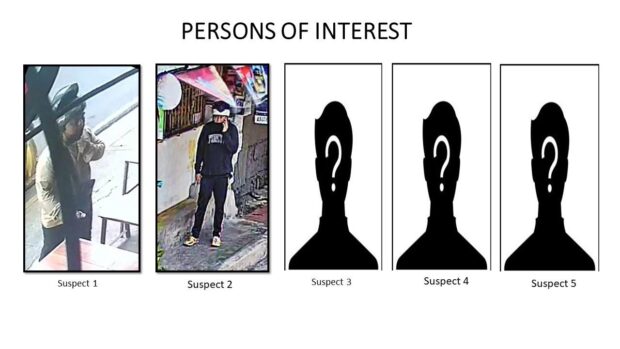
This photo from the Quezon City Police District shows the faces of two “persons of interest” in the brazen attack on photojournalist Rene Joshua Abiad on June 29, 2023, as taken from a CCTV footage.
The Presidential Task Force on Media Security (PTFoMS) and the National Union of Journalists of the Philippines (NUJP) called on Congress to amend a law requiring members of the press to serve as witnesses in antidrug operations.
The call followed a recent attack on a newspaper photographer who was a witness to several drug busts, wounding him and killing his nephew.
“We commend colleagues who are willing to sign as witnesses out of a sense of civic responsibility but maintain that the best way for journalists to ensure transparency and accountability in these operations is by doing our jobs and reporting on drug raids and buy-busts critically and independently,” the NUJP said in a statement on Wednesday.
The PTFoMS is urging lawmakers to pass the “overdue” amendment to Republic Act No. 9165, or the Comprehensive Dangerous Drugs Act of 2002, to remove the inclusion of a member of the media among three persons required to be present during the physical inventory of drugs seized by the authorities.
RA 10640, which was passed in 2014, amended Section 21 of RA 9165, but did not completely exclude a media representative from acting as a necessary witness during the physical inventory and taking of photographs of illegal drugs that had been seized.
‘Unnecessary’
Instead, the new law reduced the number of required witnesses from three to just two—an elected public official and either a representative of the National Prosecution Service or a journalist. The chosen two shall be required to sign the copies of the drug inventory.
“Given the advances in technology and with the Supreme Court already mandating the Philippine National Police and other law enforcement agencies to use body cameras in some of their operations, the need for the presence of members of the press during antidrug operations and inventory of seized evidence has become unnecessary,” PTFoMS Executive Director Paul Gutierrez said in a statement on Sunday.
He called on members of the media and their organizations to support the media task force in asking Congress to amend the law.
“This is also for the good of all members of the press,” said Gutierrez, a former president of the National Press Club (NPC).
The inclusion of the provision requiring neutral observers of drug busts was a recognition by the lawmakers of the public’s apprehensions about possible corruption and evidence tampering by antidrug operatives in favor of drug suspects.
But Gutierrez said that with new technology and “appropriate safeguards” to be placed by Congress and the judiciary, antidrug operations could be conducted with “greater transparency and in real-time without the need of a journalist being present.”
Clamor since 2018
He said that excluding members of the press from serving as witnesses to antidrug operations and inventory of evidence would also remove from them the burden of attending court hearings and the risk of being targeted by drug traffickers.
“Also, it would remove petty corruption whereby members of the press are paid by antidrug operatives in exchange for affixing their signatures to the inventory sheet and testifying in court,” he noted.
The NUJP, NPC and other press groups have been campaigning for this amendment since 2018, after their members and colleagues were being put at risk of reprisal from drug traffickers and being cited in contempt if they missed court hearings on the cases where they are supposed to stand as witnesses.
“In the meantime, we urge fellow journalists to reconsider agreeing to be witnesses in antidrug operations,” the NUJP said in its statement.
In June last year, Makabayan lawmakers filed House Bill No. 572, or the Journalists’ Exemption Law, removing media workers as required witnesses in antidrug operations.
It was consolidated with other similar bills into HB 7814, which contained a provision stating the “presumption of guilt” of a drug suspect and reintroduced the death penalty. HB 7814 was approved by the House on third and final reading on March 3, 2021. Its counterpart Senate bill is still in committee.
Ambushed
The clamor for the amendment sounded more urgent after Rene Joshua Abiad, a 37-year-old photojournalist of Manila-based tabloid Remate, and his family of six were ambushed by gunmen in Quezon City on June 29.
Abiad suffered two gunshot wounds and his 4-year-old nephew was killed.
Three other relatives and a bystander were also wounded.
Investigators have not cited a motive for the attack, but police said they were looking at the role of Abiad as a witness in court for both the PNP and Philippine Drug Enforcement Agency in several drug cases.
The Quezon City Police District (QCPD) have released pictures of two of the five “persons of interest” in the shooting, without disclosing their identities, and asked them to surrender.
QCPD director Brig. Gen. Nicolas Torre III said investigators were “sure” that the two men were hired guns.
Abiad’s shooting was the latest in a string of attacks on journalists in the Philippines, a country long considered to be among the most dangerous in the world for media people to work in.
On June 3, 2009, Tiburcio “Jojo” Trajano Jr., a correspondent also of Remate, was killed in a gunfight between the police team he had accompanied and members of a drug syndicate in Taytay, Rizal province.
RELATED STORY:
Photojournalist’s work, role as drug witness ‘motives’ for ambush